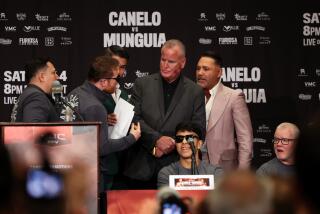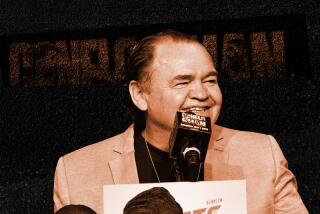For Roach, winning is the payoff
There are 1.3 million reasons, all of them green and decorated with a picture of George Washington, for Freddie Roach to be thrilled at landing the job of training Oscar De La Hoya for his May 5 mega-fight against Floyd Mayweather Jr.
But Roach is only excited about the chance to further his success in boxing, not the monetary measurement of that.
“I’m not a money guy,” says Roach, 47.
He speaks Monday as he stands in the midst of the daily chaos that is his life and his gym. It is called the Wild Card Gymnasium, is in your basic laundry-pizza-pawnshop strip mall near Santa Monica and Vine and almost never has fewer than 50 to 60 training boxers on-site at one time, in a second-floor gym about the size of three regulation rings. The font style of the sign identifying the gym is L.A. graffiti.
In a sport full of it, Roach is not a bling guy. The next time he asks for a limo will be the first. He drives a 3-year-old Lincoln, and neither far nor often.
“I used to live in Mount Washington, eight miles away, but I hated the commute,” he says. “So I just moved into here [the gym]. Now, I drive two minutes to Starbucks every morning to get coffee before we open up at 6. That’s my job. To get the coffee.”
Longer-range, his job, for which he will be paid perhaps the biggest one-fight trainer’s fee ever in the sport, is to figure out a way for the sport’s only remaining superstar, De La Hoya, to beat the sport’s most skilled, most fit, most cocksure boxer, Mayweather Jr.
With less than three months before they climb into the ring at the MGM Grand in Las Vegas, Roach must navigate coolly through an already triggered minefield.
He got the job because De La Hoya’s regular manager, Floyd Mayweather Sr., demanded a $2-million fee for the fight. De La Hoya and business partner Richard Schaefer countered with $500,000 up front and $500,000 if De La Hoya won. Mayweather Sr. said no thanks and will certainly be less than thrilled to know that Roach got $300,000 more with no “if-win” clause.
That’s just the money part of the minefield.
De La Hoya and Schaefer were never certain how much they could trust Mayweather Sr.’s commitment to develop a plan that would defeat his son, even though his son hasn’t spoken to him for years and mocks his father’s recent statements about his knowledge of the sport and his own success in it.
“He lost to one legend, Sugar Ray Leonard,” Mayweather Jr. said in a recent story on Foxsports.com, “but his other losses were to journeymen and cab drivers.”
There has also been speculation that Mayweather Sr. set the training fee high to avoid working toward his son’s demise. Roach doesn’t discount that theory.
“Blood’s always going to be thicker than water,” he says.
Roach also does his best to dismiss the recent noise coming from Mayweather Sr., including a statement that Roach wasn’t good enough to help De La Hoya.
“I was mad at first,” Roach says, “but then, I realized, I have the job and he doesn’t.”
The Roach resume answers criticism nicely.
The Dedham, Mass., Irishman has trained 18 world champions, including current star Manny Pacquiao. Roach learned the trade the hard way, with 54 pro fights that included 13 losses in divisions ranging from 122 to 135 pounds.
His most memorable fight was against Bobby Chacon, on his 25th birthday. He knocked Chacon down twice in the second round, to which Chacon responded: “Is that all you’ve got?” It apparently was. Chacon won a close split decision and a newspaper headline the next day read: “Roach Has a Birthday, Chacon Gets the Gift.”
Roach trembles slightly, a result of Parkinson’s disease. He controls that with medicine, remains fit and, when necessary, tough.
A few years ago, in a bar, he was allegedly provoked enough to end a conversation with one punch.
Eventually, the punchee sued and Roach’s lawyer instructed him to skip his medicine before their day in court. That day, Roach took the stand, shaking badly. The judge took one look and dismissed the case.
Roach resembles a high school algebra teacher who forgot to shave. He speaks softly, squints through his glasses and is known for selling that demeanor to his fighters.
“The first thing I tell them in the corner,” he says, “is to breathe, to calm down.”
He is direct, never evasive, honest to a fault.
Once asked for a quick assessment of a fight moments after its conclusion, Roach pointed to his fighter’s opponent and said, “The other guy won.” Minutes later, the judges gave it to Roach’s fighter.
He says that De La Hoya is the bigger, stronger fighter and he will use that to their advantage. He also says that he has noticed De La Hoya occasionally fading in the ninth or 10th round.
“Being tired is not a good excuse for losing,” Roach says.
He calls Mayweather Jr. an “excellent fighter who is not perfect, not complete and not a big puncher.” He says Mayweather has used his quick feet to hide his flaws for years.
The most Roach ever made as a fighter was $13,000 for the Chacon fight. That alone should make his upcoming $1.3-million payday sweet.
But instead, Roach frets about the other fighters he has had to temporarily abandon, four of whom, including Pacquiao, will fight for world titles without him.
“That’s why, if we don’t win,” he says, “this all sucks.”
More to Read
Go beyond the scoreboard
Get the latest on L.A.'s teams in the daily Sports Report newsletter.
You may occasionally receive promotional content from the Los Angeles Times.











